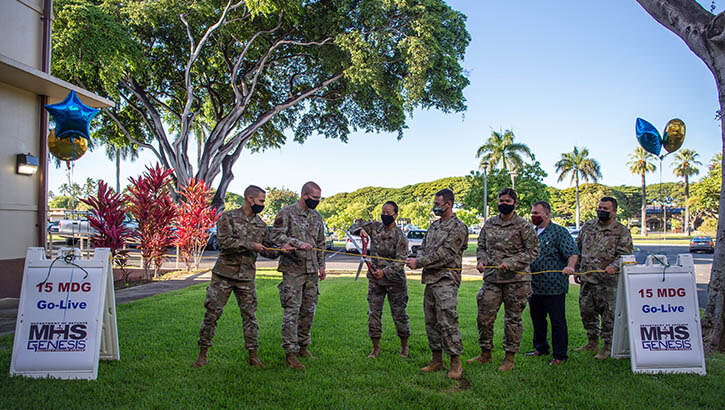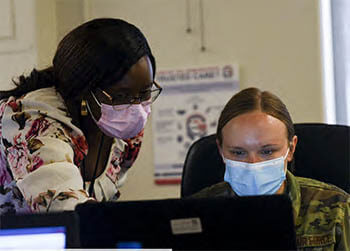MHS GENESIS ‘Super Users’ Fuel MTF Transformations
 Air Force Col. Stephanie Ku, 15th Medical Group commander, cuts a cord with 15th MDG members and MHS GENESIS project integrators during the system’s launch ceremony at Joint Base Pearl Harbor-Hickam, Hawaii, in September (Photo by: Air Force Senior Airman Alan Ricker).
Air Force Col. Stephanie Ku, 15th Medical Group commander, cuts a cord with 15th MDG members and MHS GENESIS project integrators during the system’s launch ceremony at Joint Base Pearl Harbor-Hickam, Hawaii, in September (Photo by: Air Force Senior Airman Alan Ricker).
The rollout of MHS GENESIS, the Military Health System's new electronic health records system, is bringing fundamental changes to military treatment facilities (MTFs) around the world. Among those tech experts helping to bring about the change, at both small clinics and major hospitals, the changeover is often called a "transformation."
From within those MTFs, a handful of new MHS GENESIS users have been trained as "Super Users," who play an important role in assisting the new end users of the system - the actual caregivers and staff of an MTF and peers who will be the ones using MHS GENESIS daily.
"The role of the Super User is to take their additional information, their training, and the additional hands-on experience that they get during their journey, to help an organization go through [the] transformation," said Kevin Abraham, change management team lead for the DoD Healthcare Management System Modernization Program Management Office in Rosslyn, Virginia. He's one of the people charged with deploying MHS GENESIS around the world, and helping to foster the development of Super Users.
"The way a Super User does that successfully is [to] work with their middle management - a department head, a clinic supervisor - to help understand and plan their local work flow," Abraham said.
"As we go live with MHS GENESIS at a facility like we just did in Hawaii, these Super Users really are that first line of support. They're able to help their peers as they go through the transformation's first couple of days."
MHS GENESIS is the new electronic health record system that the Military Health System, the Department of Veterans Affairs and the U.S. Coast Guard are implementing worldwide. It will allow a seamless exchange of current patient information among providers across the system.
Super Users always come from within a given MTF, and their number is about one for every 20 or so personnel, Abraham explained. They are a blend of military caregivers and civilians, from different medical disciplines.
 Marion Kimani, an MHS GENESIS trainer, gives instruction to Airman 1st Class Jenna Slaughter, 355th mental health technician, at Davis-Monthan Air Force Base, Arizona, in April 2021 (Photo by: U. S. Air Force photo by Senior Airman Blake Gonzales).
Marion Kimani, an MHS GENESIS trainer, gives instruction to Airman 1st Class Jenna Slaughter, 355th mental health technician, at Davis-Monthan Air Force Base, Arizona, in April 2021 (Photo by: U. S. Air Force photo by Senior Airman Blake Gonzales).
"Every site is unique," he said. "Whether it's the layout of the building, how they're staffed, what their clinical capabilities are, [etc.]. In order to be effective, we want to foster that ... and infuse it with further understanding of MHS GENESIS and the nuances to it."
To be successful in the role of a Super User, it helps to have an understanding of how everyone else's roles work, added Air Force Capt. Jordan Serck, a nurse and element chief of the base operational medicine clinic at McConnell Air Force Base in Wichita, Kansas.
"I can't just understand how GENESIS works from a nurse's perspective," Serck said. "I also have to understand it from the doctor-provider perspective, the technician's, the front desk, even some of the specialty clinics [like] public health, optometry - I help with them as well."
Abraham explained how Super Users assist in the implementation of MHS GENESIS "by either answering questions about the local work flow or helping users navigate the system." Subsequently, he said, some Super Users go on to become part of the MHS GENESIS "Pay It Forward" program, going to locations targeted for near-future implementation and helping them prepare to go live.
Serck added how Super Users and end users only get so much from the computer-based training.
"The familiarity with the system really comes from hands-on experience and having somebody come over their shoulder to guide them through the process," he said.
"When we initially went live ... my primary job [became] making sure other people could do their primary jobs. Having a Super User who is knowledgeable in every role is absolutely key to success. Otherwise, people just get frustrated with the system and they would give up on the change."
So, it was especially fortunate to McConnell's new users that Serck had been through the training before - he had become a Super User at his former duty station, Travis Air Force Base in California, and had helped out with MHS GENESIS trainings at several other bases in the meantime. McConnell's system came on line in April, and after a slow walk at the start, things are at a full jog right now, Serck reports.
"Nobody likes big changes, right?" he said. "But I could tell them what it was like, and lessons learned from my previous assignment at Travis, so that they could know this is actually a beneficial change in a lot of ways. I can tell you the ways that it made my life easier. I can tell you some of the challenges, and the way we make improvements, by letting [the Defense Health Agency] know we recommend a process improvement for this or that."
The Super User, or "peer expert" as Abraham calls them, "is the fuel that drives our facilities' organizational transformation."
Abraham agrees with Serck - Super Users are "critical to the success of the implementation," Abraham said.
"The best learning happens when it's somebody who is familiar with you, and what you do. ... People just receive information better if they see that person as a peer."